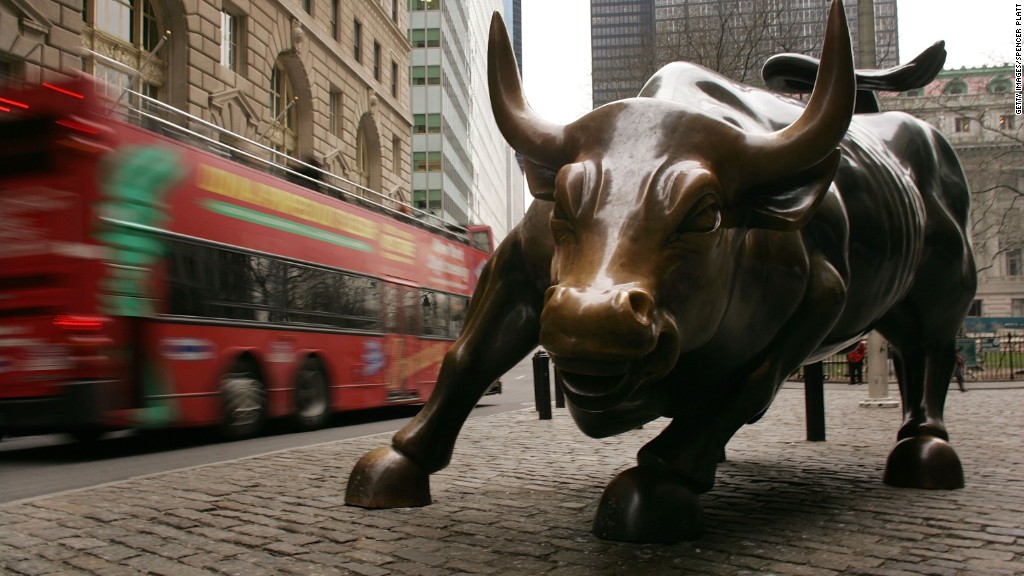
How great has the bull market of the past six years been? Only nine stocks in the S&P 500 have a negative total return since the S&P 500 bottomed.
That's right. Nine.
Who's on this unfortunate list? Several oil and energy companies. And many of them had been taking part in the huge market rally up until recently. They only gave up their gains in the past few months as crude prices evaporated.
Oil's not well. The biggest loser is driller Transocean (RIG). It's down more than 60%. The company's involvement in the tragic Deepwater Horizon BP oil spill in the Gulf of Mexico in April 2010 didn't help the stock either.
Related: 6 stocks that left the bull market in the dust
Fellow drillers Diamond Offshore (DO) and Noble (NE) have also lost money for shareholders since the S&P 500 had its lowest close of the bear market on March 9. 2009. (It actually hit the demonic intra-day low of 666 on March 6.) But they're not down nearly as much as Transocean.
Oil and gas company Denbury (DNR), which has the unfortunate ticker symbol of DNR, has also swung into negative territory in the past few months.
As recently as June, Denbury was up more than 40% from its March 2009 levels. That still lagged the broader market. But it's better than losing money.
Natural gas company Southwestern Energy (SWN) has also taken a hit as energy prices fell. All of its losses have come in the past few months.
Related: Should Warren Buffett's Berkshire Hathaway buy Southwestern Energy?

Waiting for the sun. First Solar (FSLR) is the second-worst performer in the S&P 500 since 2009.
A lot of that is due to concerns about the stock price being too expensive as well as concerns about how a glut of cheaper solar panels made by Chinese companies will hurt profits for First Solar and the rest of the industry.
Still, the stock is enjoying a nice pop this year despite the plunge in oil prices. You'd think cheap oil would be bad news for an alternative energy company because it would make consumers more willing to stick with fossil fuels. But it's possible that the worst might finally be over for First Solar.
Ding dong! Short sellers calling! The same probably can't be said for Avon (AVP). The once-proud cosmetics company has been in decline for awhile.
Earnings have fallen nearly 20% a year on average for the past few years. And it's still a stock that short sellers, investors who bet that a stock will fall, love. They hold nearly 20% of Avon's available shares.
So it's no surprise that it's the fourth-worst stock in the S&P 500 during the bull market.
Related: Avon fined for bribing Chinese officials with Gucci bags
Heck, with a market value now below $4 billion, you have to wonder if its days in the S&P 500 are numbered. With each passing day, the company's decision to turn down a $10.7 billion takeover offer from fragrance maker Coty (COTY) in 2012 looks more foolish.
After the gold rush. Although gold prices are still higher now than where they were back in 2009, the price of the yellow metal has plunged from the all-time highs it hit in 2011.
That's dragged down the stocks of several gold miners, including S&P 500 member Newmont (NEM).
The only other company that's in the red since March 2009 is utility Exelon (EXC). But it's not down that much. And like many other utilities, it offers conservative investors a fat dividend as a reward.
Exelon is also in the process of trying to get a merger with another utility, Pepco (POM), approved.
Of course, these aren't the only big losers of the past six years. They are just the worst companies currently in the S&P 500.
Several well-known companies would have also made this list, if not for the fact that they got thrown out of the index because they got too small.
Grocery chain SuperValu (SVU), for-profit education companies Apollo (APOL) and DeVry (DV) and struggling retailer J.C. Penney (JCP) are all former S&P 500 companies that have been left behind during the bull market.
Related: Are J.C. Penney and Sears destined to be the next RadioShacks?
Here is the full list (including their returns) for the 9 S&P 500 losers and these other four erstwhile blue chips. (These numbers factor in the reinvestment of dividends and were current as of mid-day March 5, 2015.)
Transocean: -60.5%
Apollo: -58.8%
First Solar: -44.3%
J.C. Penney: -41.6%
Denbury: -33.1%
Avon: -30.6%
Newmont Mining: -29.9%
SuperValu: -20.1
Diamond Offshore: -19.2%
DeVry: -19%
Southwestern Energy: -16.9%
Noble: -6.5%
Exelon: -1.2%


